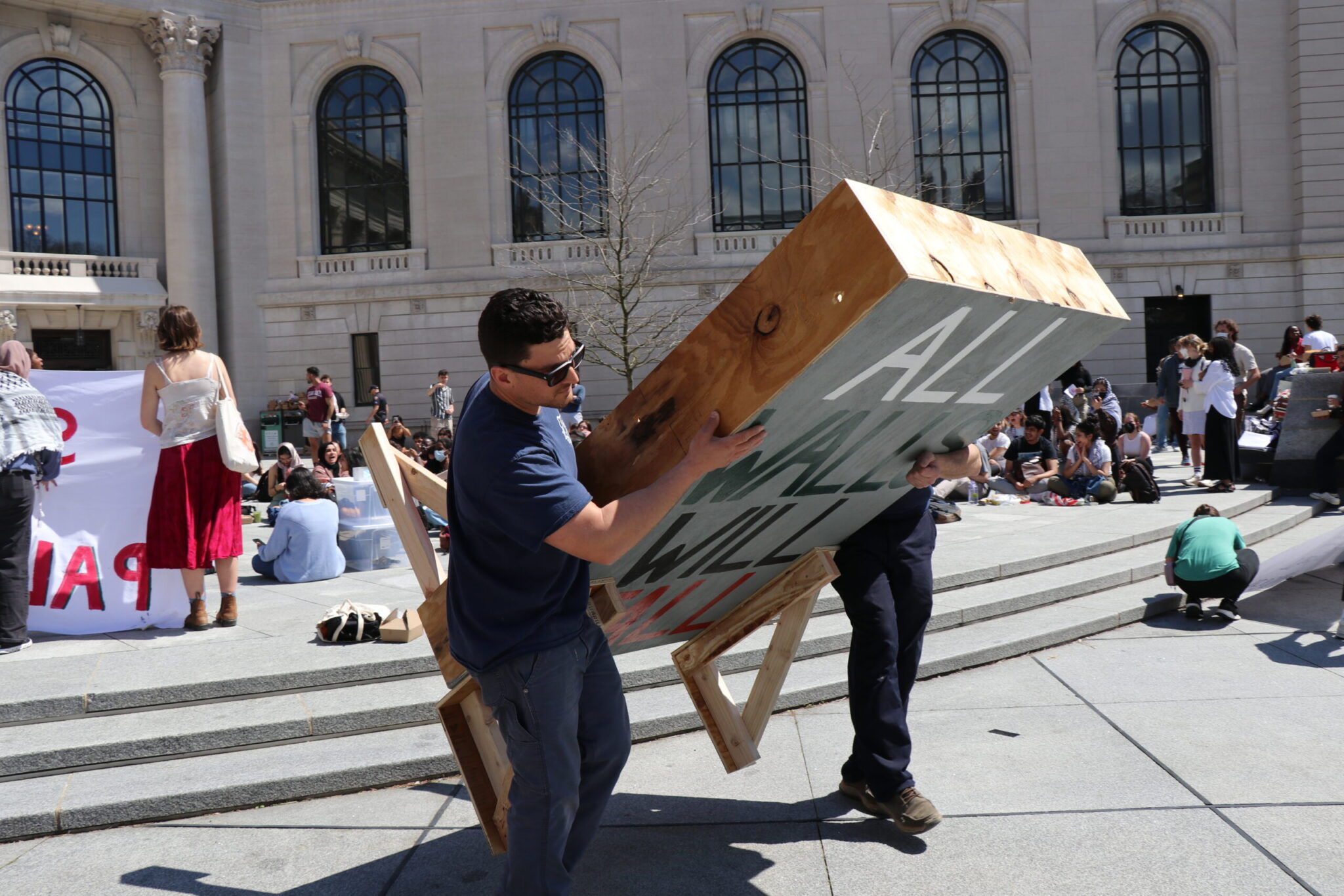Administrators fail to clearly explain policy behind forced removal of protester-installed bookshelves
Pro-Palestine protesters erected a wooden bookshelf structure on Monday afternoon on Beinecke Plaza as part of a “Books not bombs” protest. Just over an hour in, University staff began dismantling the fixture based on administrator guidance — but after back and forth with the News, administrators have yet to clarify the University regulation that forbids the structure’s placement.

Christina Lee, Photography Editor
Assistant Vice President for University Life Pilar Montalvo tasked Yale Facilities workers with unbolting and dismantling a pop-up library display on Monday afternoon shortly after 1 p.m., just over an hour after protesters calling for Yale to divest from weapons manufacturers erected the fixture.
Students installed the wooden structure as part of Monday’s “Books not Bombs” protest. Per a press release posted to Instagram account “Occupy Beinecke” — the name of the student coalition responsible for the structure — the group took inspiration from shanty towns built in 1986 to rally for Yale’s divestment from companies operating under South Africa’s apartheid regime. These structures were torn down at the mandate of Yale administrators but were rebuilt and left in place until 1988.
Just after noon, when the fixture was first installed and administrators began asking students to remove it, the News asked Montalvo at the scene under what protocol the fixture was not permitted; she asked that reporters “send an email” as she was “responding to the situation.” Around 12:30 p.m., she redirected all requests for comment to the University spokesperson and declined to individually weigh in.
“Following guidelines around free expression and peaceful assembly, and the use of outdoor spaces, Yale staff members asked that the bookcase be removed to allow free and unfettered access,” the University spokesperson later wrote to the News at 3:41 p.m.
According to the spokesperson, staff offered to have students remove the display themselves, and when the students chose not to do so, the protesters were told facilities staff would remove it. At the protest itself, however, Montalvo said that if protesters took it down themselves, they could keep it, but if administrators took it down, they could not promise to maintain the integrity of the structure nor have a storage space for it.
Yale’s spokesperson also wrote that staff offered to help organizers with the application process for putting up an art installation.
The University claimed late on Monday night that the bookcase had spanned across the entirety of the staircase leading up from Beinecke Plaza to the Schwarzman Center, thus blocking pedestrian access — but pedestrians were still able to walk around the structure to reach the other side of the Plaza, including the entrance to the Schwarzman Center.
The University did not directly address further questions, sent around 2 p.m., on the University’s policies on required access to buildings or updated status of the shelves that were taken by Yale Facilities, nor to follow-up questions sent around 5 p.m., 8 p.m. and 11 p.m. about the specific definitions of access to University facilities or of what blocking transit entails.
University policy for use of outdoor spaces states that “registered groups and organizations from Yale’s schools who want to use the University’s outdoor spaces for an event must apply for and obtain permission” and that “pathways and entryways to buildings must be kept clear and accessible.”
To apply for proper consideration and approval of requests, permission should be requested 72 hours prior to the event. Monday’s demonstrators did not inform University administrators of their intention to build the structure in advance, according to an organizer.
In September, Montalvo informed a student they could not construct a Sukkah — a hut-like temporary structure for the Jewish holiday of Sukkot — according to an email exchange obtained by the News.
“Buildings of this sort may not be constructed on campus,” she wrote.
The takedown of the structure is also not the first time Montalvo has cited University regulations in dismantling the work of protesters.
In December, Montalvo gave a student permission to take down a banner that listed the names of thousands of Palestinians killed in Gaza during the Israel-Hamas war. Later, she told the News that there were “administrative errors” made in allowing the poster to go up and in authorizing the student to take it down.
If Yale were to change its policies, it wouldn’t be the first Ivy to do so.
At Columbia University, administrators announced in February changes to their demonstration policy that reduced the protest approval window from 15 business days to two business days and created designated times and spaces for campus protests. The policy change came amid criticism of the University for its enforcement of policies regarding protests and demonstrations since the onset of Israel’s formally declared war against Hamas in Gaza, according to the Columbia Spectator.
Specifically, Columbia suspended its student chapters of Students for Justice in Palestine and Jewish Voice for Peace in November, seventeen days after revising its events policies to hand Columbia administrators “sole discretion” to determine “final and not appealable” sanctions against student groups and their individual members, per the Spectator.
Now, under policies enacted in February, Columbia “may not deny registration or approval of an exception for any Demonstration based on the viewpoint of the individual or group seeking to hold the Demonstration.”
University President Peter Salovey, Dean of Yale College Pericles Lewis, Dean for Student Affairs Melanie Boyd and Montalvo all did not respond to immediate requests for comment following the protest. Montalvo told the News to route all questions through to the University spokesperson.
Update, April 16: This article has been adjusted to clearly attribute the assessment that the bookshelf spanned the full stairway to the Schwarzman Center to the University.







